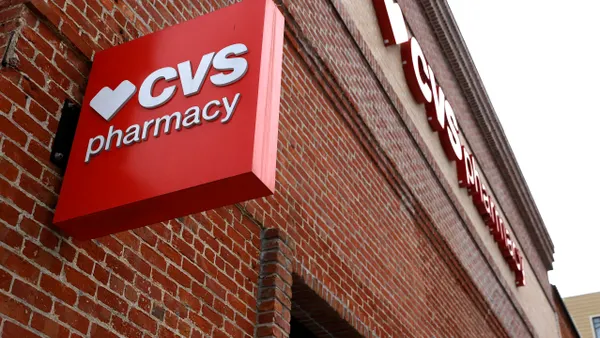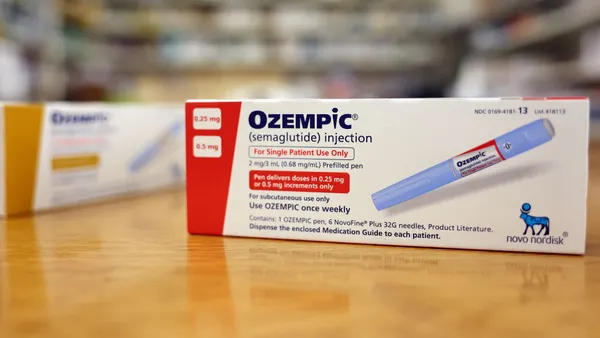Dive Brief:
- One of the largest pharmacy benefits managers in the U.S. is overhauling how millions of its commercial members pay for drugs, in a move that should save consumers money at the pharmacy counter while insulating it from regulatory reform — all without affecting long-term profits.
- On Monday, Evernorth — Cigna’s health services division that includes major PBM Express Scripts — announced it plans to transition its commercial clients to a benefits model that will pass the savings it negotiates with drugmakers onto members at the point of sale. As a result, Express Scripts will no longer retain rebates for those clients, eliminating a key grievance of PBM critics.
- Evernorth also said it will start reimbursing pharmacies in a cost-plus model, following in the footsteps of other PBMs.
Dive Insight:
Facing broad discontent with health insurers and PBMs, Cigna in January pledged to make receiving healthcare cheaper and easier for its customers. The trick is doing that at scale without cutting into its own profits, a tightrope that Cigna appears to be walking with Monday’s announcement.
Express Scripts is moving its commercial customers into what’s known as a “point-of-sale” model, wherein they’ll pay a net price inclusive of the discounts when they pick up their drugs, the company said Monday.
The model eliminates post-sale rebates for its clients, and means that Express Scripts will be compensated on a fee structure that’s delinked from drug prices.
It’s a savvy move, according to analysts. For one, it lowers Cigna’s exposure to regulatory changes. Policies reforming PBMs’ rebating practices have been in numerous bills targeting the industry from legislators concerned that the drug middlemen are prioritizing access to high-cost drugs to drive up rebates and retaining more of the savings as profit.
Secondly, it shouldn’t affect Cigna’s earnings, at least in the long-term.
Cigna already passes through more than 95% of rebate dollars to its clients, and retained rebates represent under 10% of Evernorth’s total adjusted pre-tax earnings, according to estimates from TD Cowen analyst Charles Rhyee. As a result, passing more rebates through should have a nominal affect on its bottom line, even if Cigna needs to make some near-term investments to transition into the new model.
“We remain confident in the long-term durability of our margin profile,” an Evernorth spokesperson told Healthcare Dive.
Cigna plans to move its own fully insured members into the new model in 2027. That’s about 2 million consumers.
The model will then become the default option for Evernorth clients starting in 2028, though a rebate arrangement will remain available if clients prefer.
The Evernorth spokesperson did not directly answer a question about expected client demand. But “we aim for 50% of our employers to adopt this new model over the next three years,” they said.
The model should be appealing due to lower direct costs for consumers and more visibility for employers into their budgets, the spokesperson added.
As part of the transition, Evernorth will automatically charge the lowest price for consumers at the pharmacy counter — whether that’s its own negotiated price, a cash discount or the cost with co-pay, according to the release.
This technology is already available for tens of millions of Americans, but “millions more will start benefitting” this coming January, per the company’s press release.
Evernorth expects consumers to save on average 30% on brand-name drugs as a result.
Evernorth also plans to reimburse pharmacies based on the cost of drugs, plus a dispensing fee and additional reimbursement for clinical services. The company already offered a so-called “cost-plus” model to interested clients. But now, Evernorth plans to expand the arrangement across all in-network pharmacies starting next year.
Evernorth’s announcement is reminiscent of CVS’ introduction of TrueCost, a PBM model based on the net cost of drugs with clear administrative fees, two years ago. TrueCost became an option for clients of CVS’ PBM Caremark this year.
Similarly, CVS also rolled out CostVantage, a cost-based drug pricing method for its retail pharmacies, in 2024. Since then, UnitedHealth’s PBM Optum Rx has also launched its own cost-plus model for pharmacies.
Along with helping them get ahead of potential regulation, the PBMs’ efforts reflect an underlying shift in pharmacy benefits models. Employers, staring down the barrel of steep pharmacy cost growth, express strong interest in transparent pharmacy benefit models, which give them a greater line of sight into how drugs are priced and paid for.
Employers are also increasingly open to changing their vendors, a trend that’s aligned with the entrance of newer transparent PBM companies in the market.
Still, the PBM market remains highly concentrated, with Express Scripts, Caremark and Optum Rx jointly controlling about 80% of U.S. prescriptions, prompting calls from some researchers to break up the companies.
Cigna reports third-quarter earnings on Thursday.














